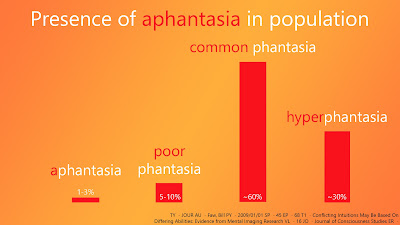I goofed around with some recent videos, but now it's time to get down to business and cover some real philosophical topics. Before shooting I'll be sharing my thoughts and findings here, so that I'll give myself some time ot process and get some feedback from you, guys.
The philosophy of language lectures opened up the path to philosophy of mind, I'll start with an inspection of behaviorism, gestalt psychology and phenomenology.
An easy way to approach those topics, I think, is through certain case-studies of mental phenomena, such as aphantasia, the blindness of the mind's eye.
There's some interesting things going on here. The study of the vividness of mental imagery surely seems like a very abstract and confusing endevour that is prone to a lot of error. In 1880, Francis Galton performed the, now famous, breakfast study, in which he asked a hundred adult men to talk about the breakfast table at which they eat breakfast every morning.
Twelve of the participants failed to contribute any useful information. Why?
Well, there's many explanations. They could be shy, poor with words, uncollaborative or have poor awareness of their own cognition. But another option seems to be particularly interesting.
Aphantasia
Commonly, people have some visual imagination. You close your eyes and imagine a red apple, and well, your mind's eye can see it. That seems to be the case for most people.
Some people are better at visualizing (hyperphantasia), some are worse (poor phantasia) and apparently some can't do it at all. That's a condition named aphantasia, which is derived from the Greek word "phantasia", which translates to "imagination", and the prefix "a-", which means "without".
Not a lot of representitive studies on the spread of aphantasia have been done. An estimation of the distribution of the capacity to produce visual imagery amongs the population would be:
 |
| Aphantasia (1-3%) < Poor Phantasia (5-10%) < Common phantasia (60%) > Hyperphantasia (30%) |
Last week I took the Vividness of Visual Imagery Quiz (VVIQ) and considered some difficulties that emerged as I tried to answer it:
Later I went through the quiz with a good friend of mine who often reported to have poor visualisation skills:
And I had a really insightful discussion with Courtney from Quiet Mind Inside about what it's like for her to have aphantasia and no inner monologue:
Prophantasia
Recently the Youtuber and life-coach AphantasiaMeow proposed the term prophantasia to refer to the ability of projecting what one imagines on top of what is physically seen.
I was unable to find any research on it and will be happy to contact him for more information soon.
 |
| Curious graphic by AphantasiaMeow |
Let's discuss!
Share your thoughts and experiences about this topic with me and help me include more considerations in future videos!
No comments:
Post a Comment